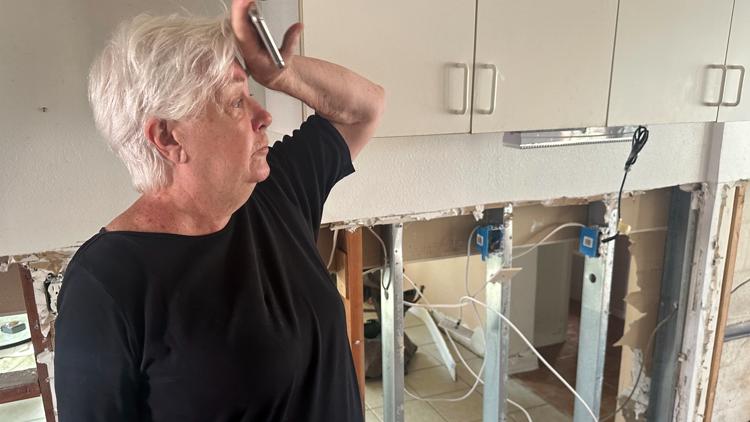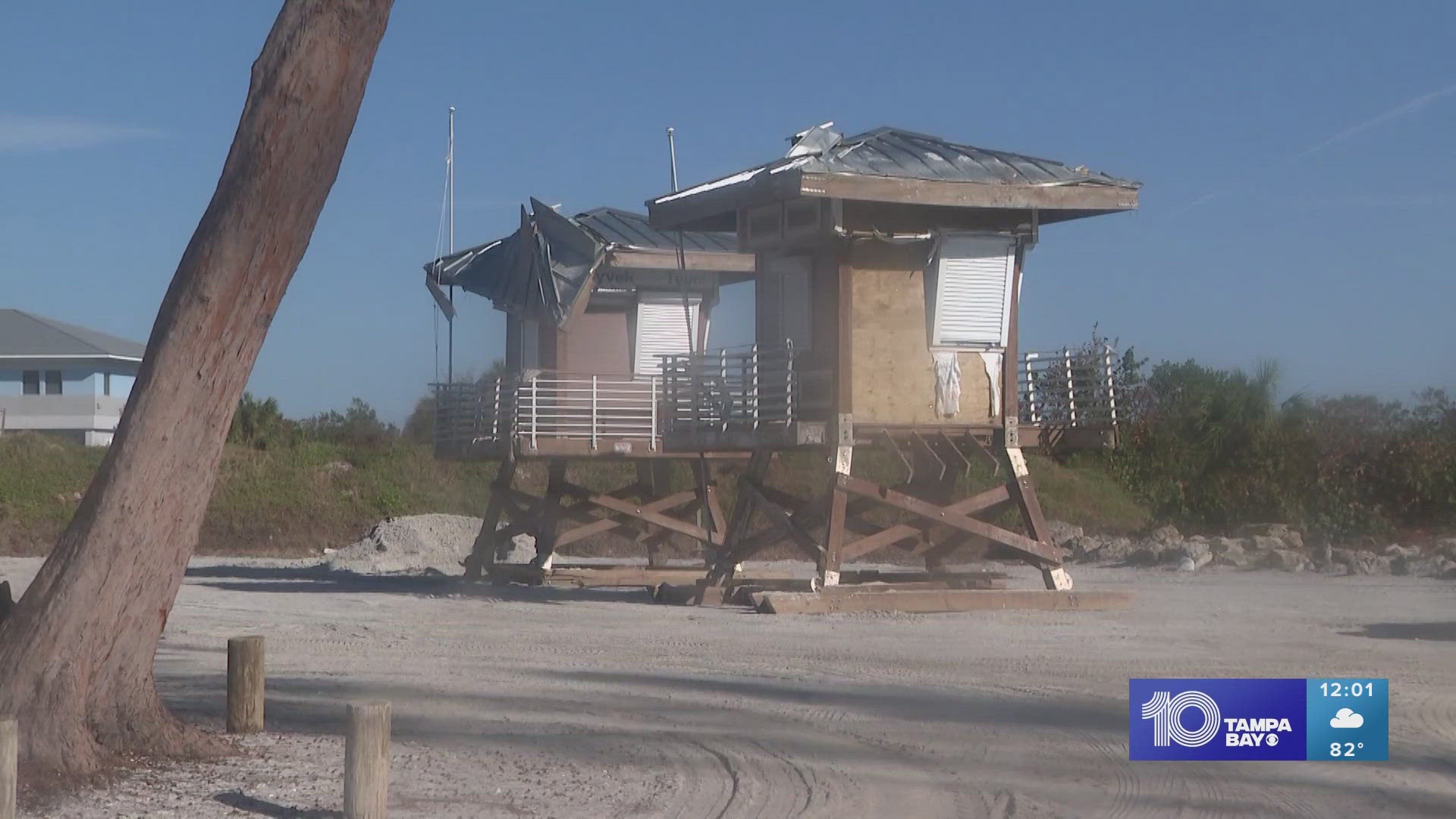TAMPA, Fla. — Floridians have been battered by three hurricanes making landfall in just over two months, with major hurricanes Helene and Milton happening less than two weeks apart.
Widespread damage from storm surge and freshwater flooding and strong winds have destroyed homes and businesses and caused multiple deaths. Recovery is happening — debris cleanups, gutting homes for repair and getting power restored are just some of the things bringing the community together.
All of this work is exhausting, understandably so. Even if you weren't one of the tens of thousands of people who were seriously impacted by recent storms, you may be feeling extra exhaustion or stress.
That's something called "disaster fatigue," and it affects many people who have survived disasters.
What is disaster fatigue?
"Disaster fatigue." First, it's not an official medical diagnosis. However, groups such as FEMA and NOAA have loosely defined disaster fatigue, also called hurricane fatigue, as a state where chronic exposure to disasters, negative experiences or news results in real-life effects on your health, emotions and well-being.
The term appears to have gained some popularity during the COVID-19 pandemic.
According to SAMHSA, "If you were involved in a disaster such as a hurricane, flood, or even terrorism, or another traumatic event like a car crash, you may be affected personally regardless of whether you were hurt or lost a loved one. You can be affected just by witnessing a disaster or other traumatic event."
"It is normal for any disaster response to increase stress and fatigue," FEMA said online. "One of the symptoms is finding it hard to make decisions when so many decisions must be made about your recovery."
Symptoms of disaster fatigue
Again, while it's not an official medical diagnosis or term, disaster fatigue can manifest itself in a variety of ways. SAMHSA says survivors of disasters could experience the following:
Physical symptoms
- Having stomachaches or diarrhea
- Having headaches or other physical pains for no clear reason
- Eating too much or too little
- Sweating or having chills
- Getting tremors (shaking) or muscle twitches
- Being jumpy or easily startled
Emotional symptoms
- Anxious or fearful
- Overwhelmed by sadness
- Angry, especially if the event involved violence
- Guilty, even when you had no control over the traumatic event
- Heroic, like you can do anything
- Like you have too much energy or no energy at all
- Disconnected, not caring about anything or anyone
- Numb, unable to feel either joy or sadness
Behavioral symptoms
- Having trouble falling asleep, staying asleep, sleeping too much, or trouble relaxing
- Noticing an increase or decrease in your energy and activity levels
- Feeling sad or crying frequently
- Using alcohol, tobacco, illegal drugs or even prescription medication in an attempt to reduce distressing feelings or to forget
- Having outbursts of anger, feeling really irritated and blaming other people for everything
- Having difficulty accepting help or helping others
- Wanting to be alone most of the time and isolating yourself
"You are not alone," FEMA says. "These are human reactions to the strain of adapting over and over to situations that threaten your survival and/or ability to cope."
Taking care of ourselves is extremely important, especially when disasters or a crisis is happening. Sometimes, it’s the little changes that can make the most significant difference. Here are some tips to combat disaster fatigue, from SAMHSA:
- Talk with others who understand and accept how you feel. Reach out to a trusted friend, family member, or faith-based leader to explore what meaning the event may have for you. Connect with other survivors of the disaster or other traumatic events and share your experience.
- Body movement helps to get rid of the buildup of extra stress hormones. Exercise once daily or in smaller amounts throughout the day. Be careful not to lift heavy weights. You can damage your muscles if you have too much adrenaline in your system. If you don’t like exercise, do something simple, like taking a walk, gently stretching, or meditating.
- Take deep breaths. Most people can benefit from taking several deep breaths often throughout the day. Deep breathing can move stress out of your body and help you to calm yourself. It can even help stop a panic attack.
- Listen to music. Music is a way to help your body relax naturally. Play music timed to your breath or to your heartbeat. Create a relaxing playlist for yourself and listen to it often.
- Pay attention to your physical self. Make sure to get enough sleep and rest each day. Don’t leave resting for the weekend. Eat healthy meals and snacks and make sure to drink plenty of water. Avoid caffeine, tobacco, and alcohol, especially in large amounts. Their effects are multiplied under stress and can be harmful, just making things worse.
- Use known coping skills. How did you handle past traumatic events like a car crash or the death of a loved one? What helped then (e.g., spent time with family, went to a support group meeting)? Try using those coping skills now.
Find a more in-depth guide on coping with disasters by clicking or tapping here for SAMHSA's information.
How to get help
You're not alone. That's something important to remember, even when it all feels hopeless. And there are ways to reach out for help. Here are a few of them.
- The Florida Department of Children and Families' Family Support Line connects individuals and families who were impacted by disasters with peers who were impacted and have recovered from previous disasters. Family Support Line: 888-850-SWFL.
- SAMSHA Disaster Distress Hotline: Call or Text 1-800-985-5990
Disaster Distress Helpline - 2-1-1 provides free and confidential information and referral to Community Resources: Call 211 to be linked to your community provider.
- National Suicide Prevention Lifeline: Call or text 988.
988 Suicide and Crisis Lifeline - American Red Cross Virtual Family Assistance Center: 1-833-492-0094
American Red Cross Virtual Family Assistance Center - National Human Trafficking Hotline: 1-888-373-7888 or text 233733
National Human Trafficking Hotline.org - Florida Abuse Hotline: 1-800-962-2873
Florida Department of Children and Families Abuse Hotline - National Domestic Violence Hotline: 1-800-799-7233 or text “START” to 88788.
National Domestic Violence Hotline - National Sexual Assault Helpline: 1-800-656-HOPE
RAINN.org



